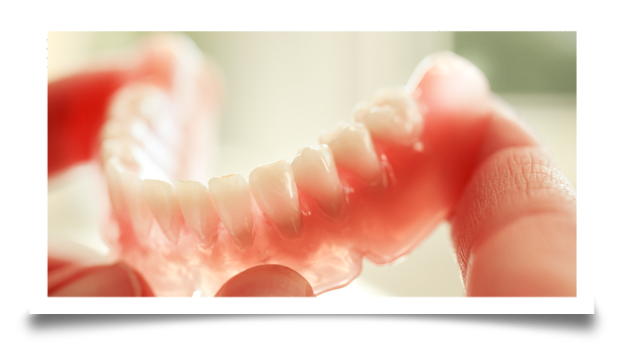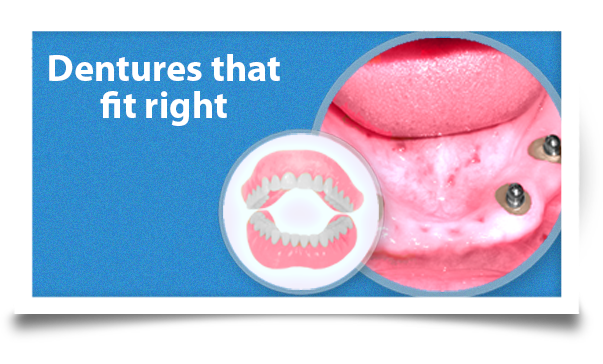DENTURES THAT FIT
Dentures
A denture is the traditional method of replacing missing teeth. Any adult between the ages of 20 to 65 statistically will lose at least three teeth. For some this may not be a problem but for others there are plenty of reasons to do something about it. Missing teeth always affect the way we speak, the way we eat and even the way we participate in the various activities that we love. One of the options provided to remedy these effects are the dentures.
What are the dentures?
In simple terms a denture is a way to replace any number of missing teeth above three, along with the surrounding tissues. They are supported by the tissues of the oral cavity and they can be either partial or complete, removable or fixed.
Removable and partial dentures are recommended for cases that miss just some of their teeth or teeth on a certain arch of the oral cavity. They are less costly than other options but also less stable.
On the other hand fixed partial dentures are more stable, are made from materials similar to the missing teeth and are made from crowns that are fitted on the teeth that are remaining in the mouth. However, they can be significantly more expensive than the removable ones.
For patients that are missing the entire set of their teeth either in the upper or on the lower arch of the oral cavity, the recommendation will go for a complete denture.
Another kind of denture that is quickly gaining support is the flexible partials. The cost may be greater than the other options described here but the process is completely non-invasive, the restoration is based in the advancements made in the field of the related digital technology and it is considered as a virtually invisible way of replacing teeth. Furthermore, it is a far more comfortable option than any other available.
How is a denture made?
The first thing that a doctor needs to do is take a dental impression of the oral cavity. Based on this impression there will be a stone model made to represent the patient’s mouth. This first model will create the custom impression tray which will then be used to acquire another impression of the mouth which will be of much greater detail and accuracy. The last measurement to be taken is the bite registration which will tell the dentist the relative position between the upper and lower teeth arches when the mouth is closed.
A first denture is made of wax rim and fitted in. This is a most critical stage as it is the one were all the adjustments will be made so that the eating process is satisfactory, any changes in speech are rectified and the patients feel comfortable. The wax denture is taken into the lab where through a rather complicated process it will form the final denture. The final denture will be inserted into the mouth depending on the option for a partial or a custom, a removable or a fixed denture, made by the patient.
Possible and expected issues
After a denture has been installed, for the first 12 to 24 hours the mouth will excrete more saliva than usual as the denture is perceived by the brain as “food”. It may sound like a joke, but it is not. The brain’s perception of the mouth is that whatever foreign substance is in there is food.
Other anticipated conditions may include:
- Sore spots wherever the denture is compressing the soft tissues. This is taken care of by adjustments to the denture.
- A denture that is too loose or too tight may also produce gagging which is appropriately corrected.
- The most common problem that may arise is the loss of taste sensations especially in the case of complete dentures. This is an unfortunate side effect that comprises one of the disadvantages of dentures.
- If there is accumulation of dental plaque, it is possible to develop a gingivitis infection. This is why it is most important to make sure that every other condition in the mouth is corrected prior to any teeth replacement option.
- The worse problem that can occur is the adverse psychology of the patient. It is a fact that some patients refuse to accept the denture in their mouths. It has nothing to do with the materials, it has nothing to do with the mouth’s tolerances and it has nothing to do with allergic reactions. It is a purely psychological issue and the dentist can do very little about it as it is beyond his control. If such a case arises then another solution may be appropriate.
Support, care and time frames
Replacing the teeth with artificial ones does not mean that the patient will stop practicing proper oral hygiene. Daily cleaning is in order. Dentures should be taken out of the mouth during sleeping to provide the tissues with time to recover.
A good denture may last for up to 5 years. Afterwards there are ways to extend the lifetime of the denture by refilling and repositioning. Inevitably at some point, new dentures will have to be constructed based on the new parameters developed inside the mouth.
If you have some teeth missing and you need to replace them for whatever reason, but do not wish to go for another of the available options, please feel free to call us or send us a message. Our staff will set up and appointment to evaluate the situation and provide you with all the available options and all the pertinent information about your specific case. You can make an informed decision that will allow us to do what we do best. Bring your teeth back where they should be.
Coupon
Contact Us
Please Give Us a Share!
- Fitting Comfort 99%
- Overall Satisfaction 100%
- Price 85%



